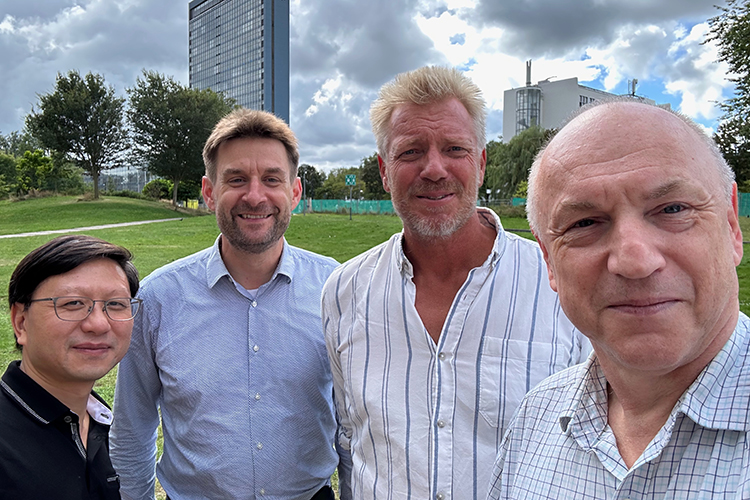UCD partners on €10m ERC project aiming to slash wireless energy use by half
Posted 6 November, 2025

Professors Anding Zhu, Rüdiger Quay, Leo de Vreede and Bogdan Staszewski
University College Dublin researchers are playing a key role in a major new (opens in a new window)European Research Council (ERC) funded project that aims to dramatically reduce the energy consumption of future wireless communication networks.
(opens in a new window)Professors Anding Zhu and (opens in a new window)Bogdan Staszewski, from the UCD School of Electrical and Electronic Engineering, are partners in the international DISRUPT project, which has been awarded a prestigious €10 million ERC Synergy Grant.
Led by TU Delft in collaboration with UCD and Fraunhofer IAF, DISRUPT seeks to develop a fully digital Radio-Frequency (RF) power architecture capable of cutting the energy use of next-generation wireless networks, such as 5G and 6G, by up to 50%.
The project is one of 66 selected across Europe to receive ERC Synergy Grant funding this year, with a total of €684 million awarded.
“Receiving the ERC Synergy Grant is a tremendous recognition of the bold and interdisciplinary vision behind DISRUPT,” said Professor Anding Zhu, Head of the RF & Microwave Research Group at UCD.
“This €10 million grant empowers us to push the frontiers of wireless technology by combining advanced materials science, semiconductor device innovation, and RF system architecture in a truly transformative way.”
Professor Bogdan Staszewski, co-founder of Equal1 Labs a startup attempting to build the world's first practical single-chip CMOS quantum computer, added the Synergy Grant showed the ERC’s confidence “in the team’s scientific vision and capabilities”.
“I personally regard this grant as a natural progression of my earlier ERC Starting Grant - now taking on an even greater challenge as we advance our research to radio-frequency power levels thousands of times higher.”
The DISRUPT project brings together world-leading experts in digital transmitter architectures, semiconductor device innovation, and RF systems.
Its members include:
- Professor Leo de Vreede (TU Delft, The Netherlands) - expert in digital transmitter architectures
- Professor Rüdiger Quay (Fraunhofer IAF and professor at University of Freiburg, Germany) - specialist in GaN semiconductor technology
- Professor Bogdan Staszewski (UCD) - pioneer in digital PLLs and transceivers
- Professor Anding Zhu (UCD) - expert in digital predistortion
The project’s goal is to design a revolutionary digital transmitter that replaces energy-intensive analogue components in base stations - which currently account for over 70% of network energy consumption.
The team’s approach will co-integrate advanced CMOS (Complementary Metal-Oxide-Semiconductor) with a yet-to-be-developed segmented III-Nitride semiconductor platform, creating a fully digital RF transmitter structure capable of generating high-power, wideband, coherent signals with exceptional efficiency and precision.
The project will also pioneer AI-based signal optimisation and energy efficiency techniques for application in 5G and 6G networks, and will work closely with industry partners to ensure early-stage technology transfer and long-term societal impact.
The ERC Synergy Grants are part of the EU’s Horizon Europe research and innovation programme.
See the full list of ERC Synergy Grant recipients from this round (opens in a new window)here.
“Collaboration is at the heart of the ERC Synergy Grants,” said Professor Maria Leptin, ERC President. “In our latest round, teams of researchers will join forces to address the most complex scientific problems together - this time, they are more international than ever. The competition was fierce, with many outstanding proposals left unfunded.
“With more funds, the ERC could fully capitalise on this wealth of first-class science. Such scientific endeavours are what Europe needs to be at the real forefront.”
By: David Kearns, Digital Journalist / Media Officer, UCD University Relations (with materials from Emma Loughney, UCD Research and Innovation)
To contact the UCD News & Content Team, email: newsdesk@ucd.ie







